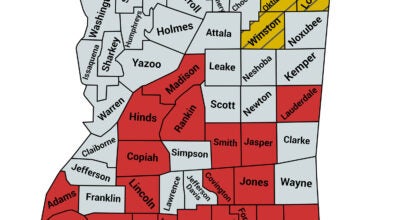Oxford School District to collaborate with Winter Institute for Racial Reconciliation at Ole Miss
Published 10:21 am Tuesday, February 28, 2017
Some parents want it, others do not.
So now the Oxford schools must decide whether they want the William Winter Institute for Racial Reconciliation at Ole Miss to help with teaching faculty members on race issues in the classroom or not.
More than a dozen people spoke both for and against the Oxford schools working with the Winter Institute at last night’s meeting of the Oxford School Board. Parent Lee Habeeb made it clear he thinks it is a bad idea.
Habeeb, who has a child in the schools, took the podium first to explain his stance against the Institute entering the OSD. He said that the Institute has faculty who say, “hateful things about half the people of the state, good and decent white people who think and vote differently than the partisan staffers.”
“We ask that the Winter Institute vote be delayed so that the people of this town can get a real public forum,” he added, referencing a special meeting the board held with a group of concerned parents alongside a lawyer last fall. “Parents have a right to ask the Winter Institute about their ugly language and their fierce partisanship.”
Habeeb cited election-related social media posts from Jennifer Stollman, the Academic Director of the Institute.
In one Facebook post, Stollman shared an election night statement from Kamden Strunk which read:
“Here’s my plan: 1) Weep for the visible operation of white supremacist heteropatriarchy on display in our election tonight. 2) Not get out of bed for a couple days. 3) Get back up and get back at the hard work of critical education, critical praxis, and transforming our racist, misogynistic, heterosexist, xenophobic, violent culture.”
“Is this really what Stollman thinks about her country?” Habeeb asked. “That we’re misogynistic, racists, sexists and homophobic? Is this what tolerance sounds like?”
Habeeb also spoke about his own heritage.
“I am a brown person, I am an Arab,” he said. “I deplore prejudice of all kinds, I know the sting of prejudice, and I have felt it. I train my daughter to call out any racial slurs or prejudice. Calling someone a racist who you don’t know, whose heart you don’t know and who is not a racist — that’s a slur, too.”
In addition, Habeeb presented an article from New York Magazine about the Implicit Association Test (IAT) which was found to no longer be a successful measuring tool for implicit bias and racism.
“We can’t tolerate hate speech on either side,” Habeeb said. “White people’s sensitivities matter, too. We are tired of being called racists when we’re not. This word stings like the N-word. I don’t like when white liberals call me a racist. It’s despicable. We demand an open hearing, racists cannot teach.”
Others favor Winter Institute
After Habeeb finished, there were a total of 13 speakers on both sides of the issue who took the floor.
Longtime (and now retired) teacher Anne Steel spoke in favor of the Institute.
“Mr. Habeeb, you and I have some things in common,” Steel said. “We both care greatly about the children of our community. That is something we should not lose sight of.”
She went on to laud the Welcome Table program that the Institute would be offering the OSD faculty.
“(The program) looks at relationship building among races, genders and sexual orientation,” she said. “I don’t see anywhere in this plan where mistrust or name-calling or hate is found. I am in favor of it.”
Habeeb’s wife Valerie spoke after Steel and said that the Institute can portray a certain image with their printed materials, but then practice another.
“I don’t care how nice the brochure looks,” she said. “It’s all very cleanly scrubbed. When you allow the leaders of the Institution to say everything so brazenly and openly, that sets the tone for what they believe in.”
“You wonder why my husband was so animated,” she added. “Try being called a racist for simply standing up and having the chutzpah to say something this Board should have done to begin with: take the time to investigate the folks they’re going to allow into the schools.”
April Grayson, part of the community building team for the Welcome Table program, says that the facility welcomes these dialogues.
“(They) can be fruitful, rewarding and easier with a structure of respect, relationship building and trust,” Grayson said. “This is why we’re asked into more spaces than we can take on as a team. We’ve worked in almost 20 communities in Mississippi, Tennessee and New Orleans, with a range of people who identify all over the political spectrum.”
Grayson talked about Stollman’s work, as well.
“Because of her record of challenging, but compassionate trainings, (Stollman) has been invited by dozens of groups including the Mississippi Police Chiefs Association, the Mississippi Public Defenders Association and leadership universities in the south, west and northeast,” she said. “Our job is to open a productive space that is open to all voices and to take our own perspectives out of the way.”
Whitney Byars, a former school board member, said she didn’t have a strong opinion on either side of the matter.
“These board members have the best of intentions when it comes to your children,” she said. “They want to make sure that every child is taken care of and I know that from my experience being on the board.”
The board ultimately voted to move forward with their plans for collaborating with the Institute. However, they decided that the Welcome Table sessions will be 100 percent voluntary; the training will be up to discretion of the current school administrators.





